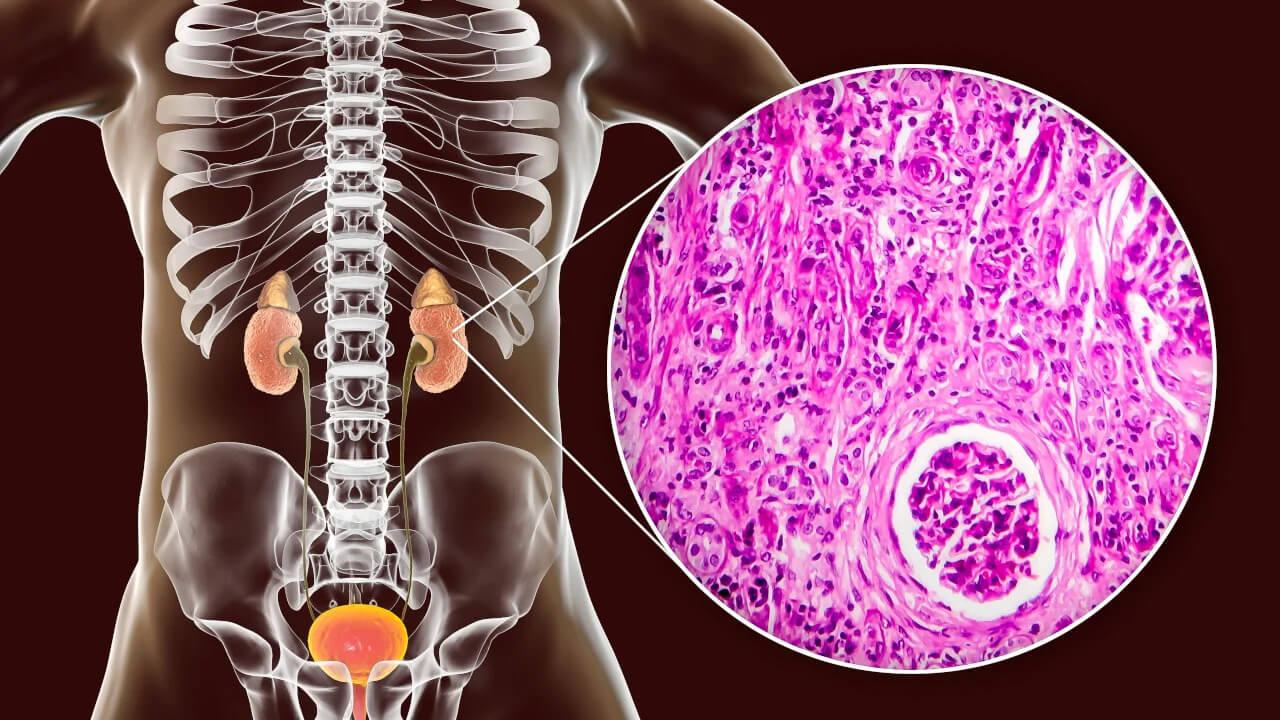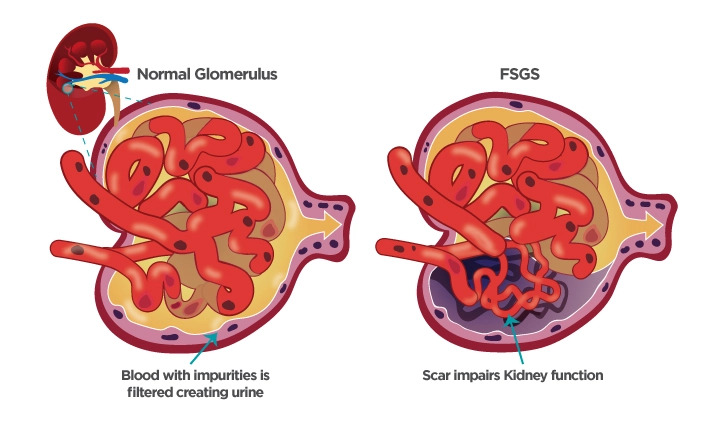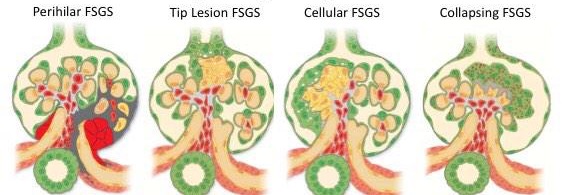Calls for Ukraine
Calls for Europe
Calls for USA

Glomerulosclerosis is a disease characterized by damage to the glomeruli, which leads to a violation of the filtering ability of the kidneys. According to the World Health Organization, this pathology affects 1% to 3% of people worldwide. According to a study published in The Lancet, glomerulosclerosis is one of the most common causes of chronic kidney disease. Therefore, the search for new effective methods of treatment is an important task of modern medicine, and stem cell therapy is one of the most promising areas in this area.
Many diseases can affect kidney function by attacking and damaging the glomeruli (tiny structures that filter and purify the blood). Such diseases are called glomerular. A fairly common of these is focal segmental glomerulosclerosis. FSGS often leads to kidney failure, which requires replacement therapy (dialysis).

The term “focal” means focal, that is, some glomeruli undergo a scarring process, while the rest remain normal. “Segmental” indicates that only one part of a particular glomerulus is damaged. Focal segmental glomerulosclerosis affects both children and adults. Men get sick slightly more often than women.
The main FSGS classification system is based on the results of light microscopy – the analysis of tissues taken by biopsy. Depending on the histological picture, the following forms of the disease are distinguished:
The prognosis of focal segmental glomerulosclerosis largely depends on the histological form. Collapsing FSGS is considered the most dangerous for patients, it quickly leads to terminal renal failure. The least dangerous is peripheral.

By the nature of the origin, 4 types of FSGS are distinguished:
Determining the form of the disease helps to choose the right tactics for the treatment of glomerulosclerosis.
With FSGS, many patients experience cycles of remission and relapse. Some people are asymptomatic. Others have the following symptoms:
Some patients may also experience a decrease in thyroid hormone levels. This condition can be controlled by taking synthetic thyroid hormones.

The following methods are commonly used to diagnose FSGS:
Genetic testing is also sometimes performed to identify hereditary diseases that can provoke the development of glomerulosclerosis.
Depending on the type and severity of the disease, the following methods may be used to treat FSGS:
Unfortunately, there has not yet been a significant breakthrough in the medical treatment of renal pathology. Currently available approaches can only delay the progression of the disease. To increase the life expectancy of patients, methods such as dialysis and transplantation are used. However, dialysis cannot completely replace kidney function. And an acute shortage of donors and the potential risk of rejection of a transplanted kidney limits the possibilities of transplantation. Moreover, in autoimmune forms of FSGS, there is a very high probability of recurrence of the disease after transplantation.
Cellular therapy is a modern therapeutic strategy that can help slow the progression of kidney failure in FSGS.
Accumulated experimental and clinical data suggest that the development of glomerulosclerosis is largely related to the number of podocytes in the glomeruli of the kidneys. Progressive forms of FSGS are usually accompanied by podocytopenia, the loss of cells that cover the capillaries in the glomeruli. These cells play a large role in the ability of the kidneys to filter blood.
Mature podocytes are highly differentiated cells that practically do not divide. Therefore, their loss can lead to irreversible impairment of the filtering function of the kidneys. Advances in experimental nephrology have shown that destroyed podocytes can be partly replaced by bone marrow stem cells.

Mesenchymal stem cells (MSCs), which are found in bone marrow, adipose tissue, and blood, are one of the most effective types of cell population for activating regeneration processes in a damaged kidney. An analysis of more than 70 scientific sources has shown that it is MSCs that give the best result in the treatment of glomerulosclerosis. According to the results of preclinical studies, the introduction of mesenchymal stem cells stimulates the regeneration of renal tissue and reduces the level of synthesis of inflammatory cytokines.
Another area of application of stem cells is to prevent the recurrence of glomerulosclerosis after kidney transplantation, which occurs quite often. The scientific literature describes a case of therapy with allogeneic bone marrow mesenchymal stem cells (MSCs) of a 13-year-old patient. A teenager developed a relapse of FSGS after a kidney transplant and standard treatment failed. After three MSC infusions in a patient:
Stem cell treatment was not accompanied by any side effects.
All these data prove that cell therapy can be an effective treatment for kidney diseases. If you are interested in the possibility of stem cell treatment, please contact our medical coordinator by phone or using the feedback form.
MedTour company cooperates with the best clinics for the treatment of kidney diseases around the world. We now offer a unique opportunity for stem cell therapy for FSGS. Call or fill out the feedback form to contact the medical coordinator. He will answer all your questions and select the clinic that is most suitable for the treatment of your disease.
Andrey Kovalchuk, biotechnologist, PhD, director of the stem cell bank of LLC “Genome”, head of the bank of umbilical cord blood, tissues and human cells on the basis of Gorbachevsky TNMU, spoke about the achievements and features of regenerative medicine.
To learn more about the possibilities of cell therapy for kidney diseases, get a free consultation from a MedTour coordinating doctor.
What diet should be followed for glomerulosclerosis?
Dietary recommendations include: reducing salt and fat intake, and reducing protein intake (including meat, chicken, fish and eggs) to 0.5 per kg of body weight.
What is the difference between glomerulonephritis and glomerulosclerosis?
Glomerulonephritis is an inflammation of the membrane tissue in the kidneys that serves as a filter that clears the blood of metabolic waste and excess fluid. Glomerulosclerosis is the process of scarring of tiny blood vessels in the kidneys.
Can stem cells help kidney disease?
There are a number of studies that prove that mesenchymal stem cells play an important role in kidney regeneration. They are introduced into the body to help repair damaged kidney tissue and reduce inflammation. In addition, stem cells are being used in conjunction with organ transplants to eliminate the need for lifelong immunosuppressive drugs.
Please rate the work of MedTour
